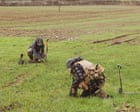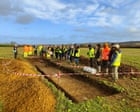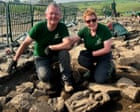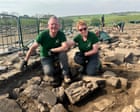They may have left this isle around 1,500 years ago, but those Romans are still regularly making news stories in London and further afield around Great Britain.
Each new discovery helps us to further our knowledge and understanding about this fascinating period of British history.
- I got into hot water and jazz at Bath’s 1960s Roman Rendezvous | Letteron 2025-07-25
Now that the Roman baths are hosting music concerts, Barbara Penrose recalls being allowed to swim with other partygoers Amanda Hart, director of archaeology at the Roman baths in Bath, need not go back to Seneca to find evidence of music at the baths (Singing in the bath: summer gigs bring noise back to Bath’s Roman attraction, 20 July).In 1963, as part of the Bath festival, a Roman Rendezvous was held in the evenings at the great bath, when a jazz group played. There was dancing, food on offer, and – best of all – swimming in the bath. Continue reading…
- Singing in the bath: summer gigs bring noise back to Bath’s Roman attractionon 2025-07-20
Summer Lates series to feature live performances and DJ sets of disco, funk, gospel and jazzWhen night falls and the Great Bath empties of visitors, it usually morphs into a quiet place of glimmering light and shadows. But not at weekends this summer.DJs and musicians are to set up next to the steaming water and turn the historic space in the city of Bath into something of a party venue. Continue reading…
- The Guardian view on metal detecting: hobbyists as well as experts can play a part in unearthing the past | Editorialon 2025-07-06
Detectorists and archaeologists sometimes clash, but the recent find of two Roman swords was the thrilling result of collaborationThe discovery of two swords at a dig in Gloucestershire has fuelled speculation that a Roman villa may once have stood there, at a period in the second or third century AD when Saxons were making inroads in the region. Experts think that the blades may even have been deliberately hidden – but not deep enough to conceal them from a novice metal detectorist, Glenn Manning. Next month, the public will get a chance to see the weapons when they go on display at the Corinium museum in Cirencester, to which they have been given.The items join a growing list of striking finds by hobbyists. These include a gold nugget found in the Shropshire Hills by Richard Brock, who located it with the help of an old machine that was “only half working”. Another newcomer dug up a gold necklace bearing the initials of Henry VIII and Katherine of Aragon, which is now in the British Museum. Continue reading…
- Iron age settlement found in Gloucestershire after detectorist unearths Roman swordson 2025-07-04
When Glen Manning discovered two cavalry swords, a later dig revealed two distinct chapters of British historyIt began with an extraordinary piece of fortune: a metal detectorist on only his second expedition coming upon two very rare cavalry swords on the brink of being lost for ever.A dig by professional archaeologists and volunteers at the spot in Gloucestershire has now found that the swords may have been buried in the grounds of a grand Roman villa built on the site of an iron age settlement. Continue reading…
- Volunteer archaeologists unearth winged goddess at Hadrian’s Wall – videoon 2025-05-21
Jim and Dilys Quinlan, who discovered the stone relief of the goddess of victory, have volunteered at Vindolanda, the site of an important Roman fort near Hexham, for 21 seasons. Dilys said: ‘We’ve spent the vast majority of our annual leave at Vindolanda over the years. As veteran diggers, it is without doubt the most wonderful thing we’ve ever done and, importantly, it’s something we do as a couple.’ The 47cm-tall carving is thought to have symbolised the end of war and to have been part of a much bigger reliefAmateur archaeologists unearth winged goddess at Hadrian’s Wall Continue reading…
- Amateur archaeologists unearth winged goddess at Hadrian’s Wallon 2025-05-21
Exclusive: Married volunteer diggers discover stone relief at site of Roman fort Vindolanda in NorthumberlandA striking Roman depiction of the winged goddess of victory has been discovered near Hadrian’s Wall by volunteers helping archaeologists on an official excavation.The stone relief was found by a Merseyside couple at Vindolanda, the site of the important Roman fort near Hexham, Northumberland. Continue reading…
- Jeremy Deller’s fake Roman mosaic review – is that a smiley face on the ancient ship’s flag?on 2025-04-29
North Yorkshire coastWith its swooping whale, snapping seal and mischievous god, the artist’s tricksy new work, made with Coralie Turpin, is just one of the fun-filled elements of Scarborough’s Wild Eye coastal art trailIt would be too simple to say that Jeremy Deller is interested in history. It would be more accurate to say he’s interested in things that aren’t there; or things that were once there; or perhaps things that could have been there. Protesting miners, deceased soldiers, inflatable sites of pagan worship have all been created or re-created by the Turner prize-winning artist, who has now turned his hand to a “speculative [Roman] mosaic” for Scarborough’s Wild Eye coastal art and nature trail.Created with sculptor Coralie Turpin, Deller’s mosaic is a “semi-trick” – a suggestion of a Roman masterpiece that has been uncovered on the shores of the seaside town with genuine Roman history. On the cliffs above the work sits the remains of a Roman signal station, and the mosaic is fragmented and inaccurate as if made from memory rather than a photograph, generating a sense of authenticity. “In 100 years’ time – or whenever – when this is all underwater and it is rediscovered, someone will think ‘Fuck, there was a Roman villa here,’” says Deller. Continue reading…
- Bite marks on York skeleton reveal first evidence of ‘gladiators’ fighting lionson 2025-04-23
Study offers rare insight into human-animal combat during Roman empireBite marks from a lion on a man’s skeleton, excavated from a 1,800-year-old cemetery on the outskirts of York, provide the first physical evidence of human-animal combat in the Roman empire, new research claims.While clashes between combatants, big cats and bears are described and depicted in ancient texts and mosaics, there had previously been no convincing proof from human remains to confirm that these skirmishes formed part of Roman entertainment. Continue reading…
- British rebellion against Roman legions caused by drought, research findson 2025-04-17
The pivotal ‘barbarian conspiracy’ of AD367 saw Picts, Scotti and Saxons inflicting crushing blows on Roman defencesA series of exceptionally dry summers that caused famine and social breakdown were behind one of the most severe threats to Roman rule of Britain, according to new academic research.The rebellion, known as the “barbarian conspiracy”, was a pivotal moment in Roman Britain. Picts, Scotti and Saxons took advantage of Britain’s descent into anarchy to inflict crushing blows on weakened Roman defences in the spring and summer of AD367. Continue reading…
- The brain collector: the scientist unravelling the mysteries of grey matter – an Audio Long Read podcaston 2025-04-12
Alexandra Morton-Hayward is using cutting-edge methods to crack the secrets of ancient brains – even as hers betrays herThere are more Audio Long Reads here, or search Audio Long Read wherever you listen to your podcasts Continue reading…









